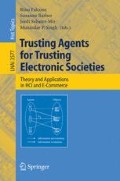Abstract
Communication is essential in multi-agent systems, since it allows agents to share knowledge and to coordinate. However, in open multi-agent systems, autonomous and heterogeneous agents can dynamically enter or leave the system. It is then important to take into account that some agents may not respect – voluntarily or not – the rules that make the system function properly. In this paper, we propose a trust model for the reliability of agent communications. We define inconsistencies in the communications (represented as social commitments) in order to enable agents to detect lies and update their trust model of other agents. Agents can also use their trust model to decide whether to trust or not a new message sent by another agent.
Access this chapter
Tax calculation will be finalised at checkout
Purchases are for personal use only
Preview
Unable to display preview. Download preview PDF.
References
Schillo, M., Funk, P.: Who can you trust: Dealing with deception. In: Proceedings of the workshop Deception, Fraud and Trust at the AA 1999, pp. 95–106 (1999)
Conte, R., Paolucci, M.: Reputation in Artificial Societies. In: Social Beliefs for Social Order. Kluwer Academic Publishers, Dordrecht (2002)
Sabater, J., Sierra, C.: Social regret, a reputation model based on social relations. SIGecom Exchanges. ACM 3.1, 44–56 (2002), http://www.acm.org/sigecom/exchanges/volume_3_02/3.1-Sabater.pdf
Castelfranchi, C., Falcone, R.: Principles of trust in mas: Cognitive anatomy, social importance, and quantification. In: Proceedings of ICMAS 1998, pp. 72–79 (1998)
Dellarocas, C.: Analyzing the economic efficiency of eBay-like online reputation reporting mechanisms. In: Proceedings of the 3rd ACM Conference on Electronic Commerce (EC2001), pp. 171–179. ACM Press, New York (2001)
Sen, S., Sajja, N.: Robustness of reputation-based trust: boolean case. In; AAMAS 2002, pp. 288–293 (2002)
Zacharia, G., Moukas, A., Maes, P.: Collaborative reputation mechanisms in electronic market places. In: Proceedings of the 32nd Hawaii International Conference on System Sciences (1999)
Androutsellis-Theotokis, S.: A survey of peer-to-peer file sharing technologies. Technical Report WHP-2002-003, ELTRUN (2003), http://www.eltrun.aueb.gr/whitepapers/p2p_2002.pdf
Gnutella: Gnutella 0.48 Specifications (2000), http://capnbry.net/gnutella/protocol.php
Fornara, N., Colombetti, M.: Defining interaction protocols using a commitment-based agent communication language. In: Proceedings of the AAMAS2003 Conference, pp. 520–527 (2003)
Pasquier, P., Flores, R.A., Chaib-draa, B.: Modelling flexible social commitments and their enforcement. In: Proceedings of ESAW 2004 (2004)
Bentahar, J., Moulin, B., Chaib-draa, B.: Towards a formal framework for conversational agents. In: Huget, M.P., Dignum, F. (eds.) Proceedings of the Agent Communication Languages and Conversation Policies AAMAS 2003 Workshop, July 14 2003, Melbourne, Australia (2003)
Hamblin, C.: Fallacies. Methuen, London (1970)
Walton, D., Krabbe, E.: Commitment in Dialogue. SUNY Press (1995)
Simmons, M.R.: Recognizing the elements of fraud (1995), http://users.aol.com/marksimms/mrweb/fraudwww.htm
Tuomela, R.: The Importance of Us: A Philosophical Study of Basic Social Norms (1995)
Tuomela, R., Bonnevier-Tuomela, M.: Norms and agreement. European Journal of Law, Philosophy and Computer Science 5, 41–46 (1995)
von Wright, G.: Deontic logic. Mind 60, 1–15 (1951)
PGP: DTfinition of non-repudiation (2004), http://en.wikipedia.org/wiki/Non-repudiation
Morge, M.: A dialogue game for agents resolving conflicts by verbal means. In: Proc. of the 2nd worshop on Logic and Communication in Multi-Agent Systems (2004) (to appear)
McKnight, D., Chervany, N.: Trust and Distrust Definitions: One Bite at a Time. In: Trust in Cyber-societies, pp. 27–54. Springler, Heidelberg (2001)
Grandison, T.: Trust specification and analysis for internet applications (2000)
Jensen, D.: Prospective assessment of ai technologies for fraud detection: a case study. In: Fawcett, T., Haimowitz, I., Provost, F., Stolfo, S. (eds.) AI Approaches to Fraud Detection and Risk Management, pp. 34–38. AAAI Press, Fawcett (1997)
Cahill, M.H., Lambert, D., Pinheiro, J.C., Sun, D.X.: Detecting fraud in the real world. Kluwer Academic Publishers, Dordrecht (2002)
Abu-Hakima, S., Toloo, M., White, T.: A multi-agent systems approach for fraud detection in personal communication systems. In: Proceedings of the 15th International Joint Conference on Artificial Intelligence (IJCAI-1997), pp. 1–8 (1997)
Lomuscio, A., Sergot, M.: A formalisation of violation, error recovery, and enforcement in the bit transmission problem. Journal of Applied Logic (selected articles from DEON 2002 - London) 1 (2003) (A previous version of this paper appeared in the proceedings of DEON 2002)
Firozababdi, B.S., Tan, Y.H., Lee, R.M.: Formal definitions of fraud. In: Proceedings of the Fourth International Workshop on Deontic Logic, DEON(1998)
Muller, G., Vercouter, L.: Liar detection within agent communication. In: Proceedings of LCMAS 2004 – ESSLI (2004)
Singh, M.P.: Agent communication languages: Rethinking the principles. In: Huget, M.-P. (ed.) Communication in Multiagent Systems. LNCS (LNAI), vol. 2650, pp. 37–50. Springer, Heidelberg (2003)
Yu, B., Singh, M.P.: Detecting deception in reputation management. In: Proceedings of Second International Joint Conference on Autonomous Agents and Multi-Agent Systems, pp. 73–80 (2003)
Sabater, J., Sierra, C.: Reputation and social network analysis in multi-agent systems. In: Proceedings of AAMAS 2002, p. 9 (2002)
Dignum, F.: Autonomous agents with norms. Artificial Intelligence and Law 7, 69–79 (1999)
Conte, R., Castelfranchi, C., Dignum, F.: Autonomous norm acceptance. In: Rao, A.S., Singh, M.P., Müller, J.P. (eds.) ATAL 1998. LNCS (LNAI), vol. 1555, pp. 99–112. Springer, Heidelberg (1999)
Vàzquez-Salceda, J., Dignum, F.: Modelling electronic organizations. In: Mařík, V., Müller, J.P., Pěchouček, M. (eds.) CEEMAS 2003. LNCS (LNAI), vol. 2691, pp. 584–593. Springer, Heidelberg (2003)
Author information
Authors and Affiliations
Editor information
Editors and Affiliations
Rights and permissions
Copyright information
© 2005 Springer-Verlag Berlin Heidelberg
About this paper
Cite this paper
Muller, G., Vercouter, L. (2005). Decentralized Monitoring of Agent Communications with a Reputation Model. In: Falcone, R., Barber, S., Sabater-Mir, J., Singh, M.P. (eds) Trusting Agents for Trusting Electronic Societies. TRUST TRUST 2004 2003. Lecture Notes in Computer Science(), vol 3577. Springer, Berlin, Heidelberg. https://doi.org/10.1007/11532095_9
Download citation
DOI: https://doi.org/10.1007/11532095_9
Publisher Name: Springer, Berlin, Heidelberg
Print ISBN: 978-3-540-28012-5
Online ISBN: 978-3-540-31859-0
eBook Packages: Computer ScienceComputer Science (R0)

